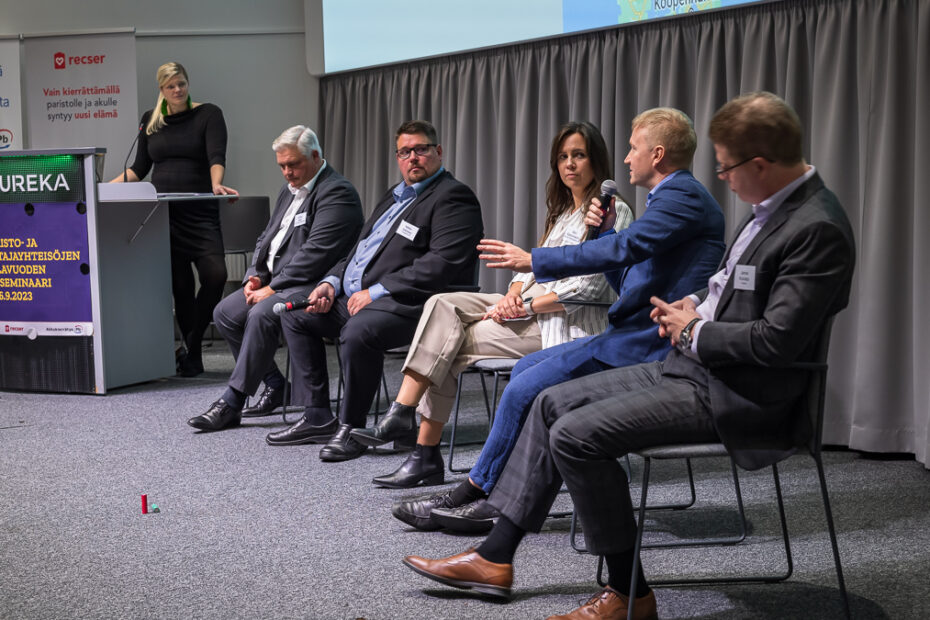The new battery regulation aims to increase European battery production and is said to create opportunities for the Finnish battery industry. But what do experts in the field think?
In a panel discussion at the battery seminar, various perspectives on the possibilities and challenges of the Finnish battery value chain were discussed. The participants in the discussion included Jarkko Vesa, Special Advisor at the Ministry of Economic Affairs and Employment, Mikko Joensuu, Chief Operating Officer at Tracegrow Oy, Sini Eskonniemi, Director of Innovation and Technology Development at Suomen Malmijalostus Oy, Tuomas Messo, Managing Director of CELLife Technologies Oy, and Janne Koivisto, Head of Public Affairs for Recycling and Waste at Fortum. The panel was moderated by Mari Haavisto from Sus+Com Agency.
The Finnish battery value chain has been developed purposefully in recent years, and Finnish operators were actively involved in the preparation of the new EU battery regulation.
The high requirements for batteries regarding sustainability and safety are in the best interests of the European industry, according to Jarkko Vesa.
“In a practical sense, it is concerning how the broad regulation will be implemented and monitored to ensure that recycling materials do not escape from Europe,” Vesa ponders.
Janne Koivisto agrees. Waste that holds a positive value also attracts operators who interpret the law more flexibly. This is an issue that requires regulatory oversight, he reflects.
“For example, interpretations of the EU Waste Shipment Regulation must be made unambiguous to ensure that batteries and battery materials remain in the hands of responsible operators.”

Sustainability and innovations
The need for battery raw materials continues to grow, but the virgin metals required for batteries are depleting. With new blending requirements for recycled raw materials, Finnish circular economy innovations can provide solutions to this, Mikko Joensuu reflects.
“However, it is not good if we develop great processes in Finland, but the raw materials escape abroad.”
The panellists note that strong expertise in raw materials, a willingness to innovate, and an entrepreneurial mindset are the superpowers of the Finnish battery value chain. Foreign investors can also trust the responsibility of Finnish operators: laws and environmental regulations are strictly followed, and working conditions are up to par.
More investments are needed
With the battery regulation, the carbon footprint and sustainability of batteries will play a more significant role. In this regard, Finnish production can take the lead, according to Sini Eskonniemi from Suomen Malmijalostus Oy.
“For the carbon footprint, it is crucial whether batteries are manufactured with clean energy or, for example, with coal power. It’s great that, in Finland, we can also produce raw materials through recycling,” Eskonniemi says.

The European battery industry will require massive investments in the coming years. The estimated sums in the public domain are so substantial that it is challenging for Finland to respond to them with state aid alone. Therefore, the industry needs private funds and risk investments.
According to the panellists, Finland is an attractive investment destination because it has the potential to organise the entire battery value chain: the mining of minerals, development and design work, as well as circular economy services. Information about a Finnish cell factory is expected in the autumn of 2023.
The skills shortage that afflicts several industries is also a risk in the battery sector. The panellists call for an increase in education because there simply are not enough experts in battery technologies.
Areas for improvement exist
The battery regulation increases the significance of producer responsibility in the battery value chain. Mikko Joensuu and Tuomas Messo state that producer organisations have a crucial role in bringing together various operators.
The panellists note that the development of the battery industry should aim for the streamlining of regulatory processes. They agree that permits should not be granted too liberally, but the process itself should be more agile, as emphasised by Sini Eskonniemi and Janne Koivisto.
The battery regulation allows for better reuse and repair than before, but there is room for improvement in matching supply and demand. In Finland, a system for predicting the use of available resources could be developed, as proposed by Tuomas Messo at the battery seminar.
“The battery industry may not become the next Nokia for Finland, but the embodiment of the true circular economy of batteries could indeed be. All of the components for the entire lifecycle of a battery are present in this room – could that be our next focus for development?”
This article is a part of the joint communications of the battery and accumulator producer organisations Recser Oy and Akkukierrätys Pb Oy concerning the EU Batteries Regulation. You can also subscribe to our newsletter to receive the latest news on the subject.
Here are links to our previous articles:
- #BatteryRegulation: The parliament adopted the new Battery Regulation on 14 June 2023—what next? (paristokierratys.fi)
- #BatteryRegulation: The content of the upcoming Battery Regulation has been published—specifications regarding producer responsibility incoming – Paristokierrätys (paristokierratys.fi)
- #BatteryRegulation: Tighter collection rates for batteries and accumulators (akkukierratyspb.fi)
- #BatteryRegulation: There is demand for recycling the rare metals used in lithium-ion batteries, but some batteries lack recycling solutions—what will happen to the increasingly demanding recycling targets of the EU? – Paristokierrätys (paristokierratys.fi)
- The upcoming Battery Regulation of the EU emphasises producer responsibility and changes our way of using, manufacturing and recycling accumulators and batteries – Akkukierrätys Pb Oy (akkukierratyspb.fi)
